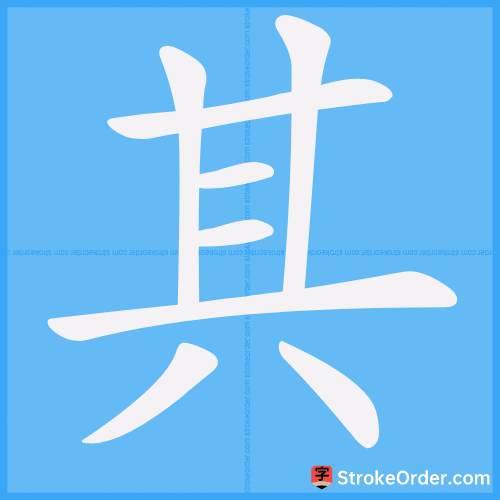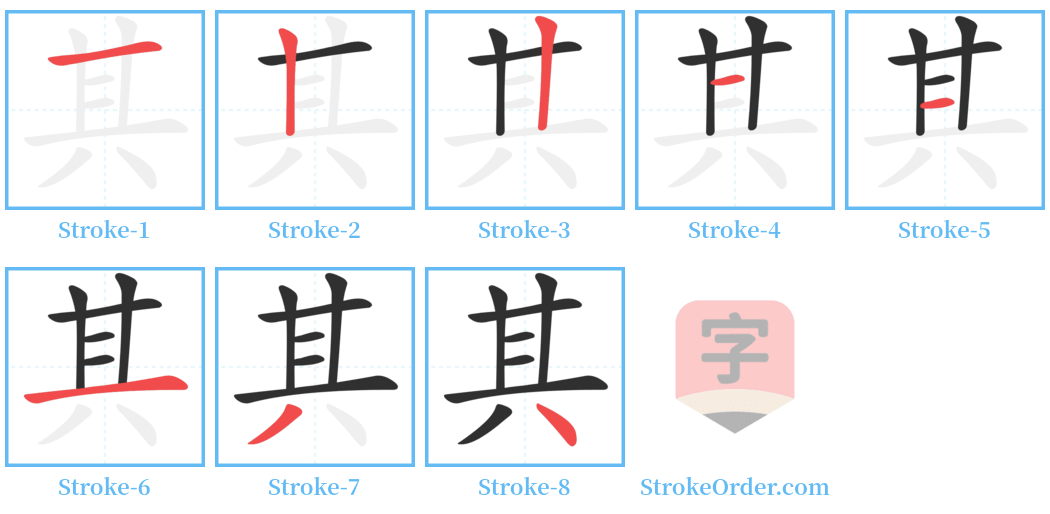其 Stroke Order
Animated Stroke Order of 其

Stroke Order Diagrams for 其

Step-by-Step Handwriting Guide for 其

Learn to Write Chinese Characters with Video Tutorials
Watch the video of writing the Chinese character "其", learn the correct stroke order (笔顺) of the character "其", and master the standard way of writing the character "其".
Free Printable Handwriting Practice with Stroke Order: 其
Printable Writing Practice Worksheet of "其" in Portrait Orientation (Tian Zi Ge)

Printable Writing Practice Worksheet of "其" in Landscape Orientation (Tian Zi Ge)

Information of 其
Pinyin
qí、 jī
Radical
八
Strokes
8 strokes
Usage
★★★★★
Definition
his / her / its / theirs / that / such / it (refers to sth preceding it)
其 [qí]
1. Pronoun, third person, equivalent to "he," "she," "they," "it," as well as "his," "her," "their," "its": 各得其所 (each finds their place), 莫名其妙 (mysterious), 三缄其口 (silent as a tomb), 独行其是 (act independently), 自食其果 (reap what one sows).
Pronoun, third person, equivalent to "he," "she," "it," "they," as well as their possessive forms.
2. Demonstrative pronoun, equivalent to "that," "that one," "those": 其他 (that other), 其余 (the rest), 其次 (the next), 文如其人 (the style fits the person), 名副其实 (the name matches the reality), 言过其实 (exaggerated).
3. Referring to something inside: 其中 (among them), 只知其一,不知其二 (only know one, not two).
4. Conjunction, equivalent to "if," "suppose": 其如是,熟能御之? (if so, can it be controlled?).
5. Particle, indicating conjecture, rhetorical questioning, commands, encouragement: 其如土石何? (what about the soil and stones?).
6. Suffix, attached to adverbs: 极其快乐 (extremely happy), 大概其 (probably).
7. Commonly used as a marker for predictions related to optional selections and conditions.
8. Denotes possession: 他的、他们的 (his, their).
9. Indicates a situation or condition that has been mentioned: 这个、那样.
10. Expresses doubt: 岂、难道 (does it mean...? Shouldn't it be?).
11. Used as a particle to add syllables in sentences: 助词 (auxiliary particle).
---
其 [qí]
1. Also pronounced qí, meaning a time limit: 通“期”. 期限 (predetermined time; scheduled time).
---
其 [qí]
1. Suffix indicating relationships relating to other nouns, especially in poetic contexts: Quantifiable in literary expressions relating to persons or circumstances.
2. The exact definition in its various contexts, such as conjunctions and auxiliary particles, stressing the nature and function across different syntactical structures in Chinese.
---
其 [jī]
1. Alternate pronunciation with meaning relating to anniversaries: 通“諅”. 周年 (anniversary).
2. Used within literary texts to denote significant durations or relationships among characters and cultural elements in Chinese classics.
---
Note: The term "其" is extensively used in classical texts and timeless literature, signifying its importance in the understanding of continuity, context, and interaction among entities, both in literature and everyday language.
Input Method for 其
Pinyin
qi2
Wubi
adwu|dwu
Cangjie
tmmc
Zhengma
ec
Four Corner
44801
Unicode
U+5176
Same Pronunciation Characters